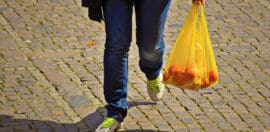Carbon credits to protect the environment and the vulnerable

Neil McFarlane, Director Climate Change, Department for Environment and Water; Hannah Ling, Greening Australia’s Nursery Supervisor, and Simon Schrapel, CEO, Uniting Communities. Credit: Jo-Anna Robinson
5 June 2019 at 8:51 am
South Australia’s first biodiverse carbon offset project, and one of the largest in Australia, is attracting cross sector support to protect revegetated land and habitat for threatened wildlife.
Run in partnership between the SA government and Greening Australia’s carbon trading arm, Biodiverse Carbon Conservation, the project operates across four state government conservation reserves and one privately owned property in the Murray–Darling Basin.
Uniting Communities has become the first not for profit to support the project, which protects more than 1,075 hectares of land.
One of these sites is The Coorong and Lakes at the end of the River Murray, a Ramsar Wetland of International Importance, which were on the brink of collapse during the millennium drought.
They attract an array of migratory and native shorebirds to its waters including Fairy Terns, Orange-bellied Parrots, Banded Stilts, and Emu Wrens.
The program also promises to improve soil and water quality, and decreasing salinity.
Uniting Communities CEO, Simon Schrapel said that as a certified carbon neutral organisation, he was excited to be leading the way on such an important project.
“We’ve worked hard to reduce our impact on the environment, as it is our customers and clients who will be among those most affected by climate change,” Schrapel said.
“Through this initiative, we can also have a direct and positive impact on the numerous wildlife species that live in or migrate to South Australia’s wetlands.”
Purchasing carbon credits attempts to equalise the amount of carbon an organisation like Uniting Communities produces by giving money to a project that sucks carbon out of the air, like the Greening Australia project.
Suzanne Ridding, a sustainable business consultant working with Uniting Communities told Pro Bono News that making a local carbon offset purchase was something the organisation had wanted to do for some time.
“It has taken the state a while to get the carbon offsets market going, but it’s great to have the opportunity to purchase locally because obviously, we can relate to them better,” Ridding said.
To achieve carbon neutral certification, entities must measure emissions, reduce these where possible, offset remaining emissions and publicly report on their carbon neutrality.
Uniting Communities was the first SA organisation and the first registered charity in the country to receive a certified carbon neutral status by the federal government and has since offset over 8,300 tonnes of carbon emissions.
The carbon off-setting project has attracted interest from the corporate sector as well, with Virgin Australia signing on as a carbon credit partner in late 2018.
Brendan Foran, CEO of Greening Australia, said that carbon credit production was still a precious commodity in Australia, and he was excited to partner with other like-minded organisations to make it happen.
“This is something we’d like to see used as a national model for putting biodiverse carbon back into areas to create healthy, productive landscapes where nature and people thrive,” Foran said.







